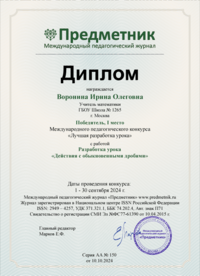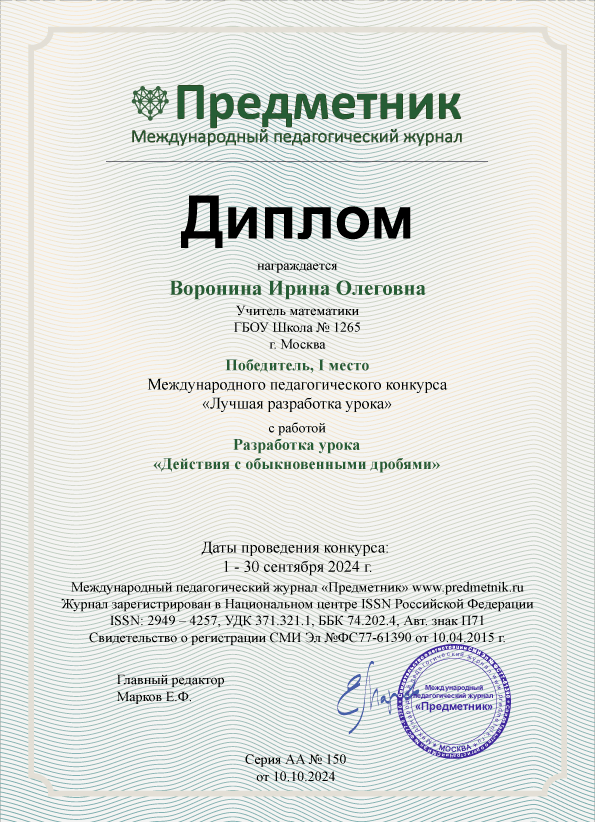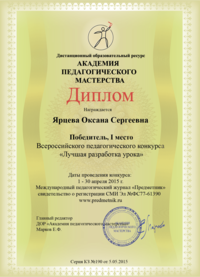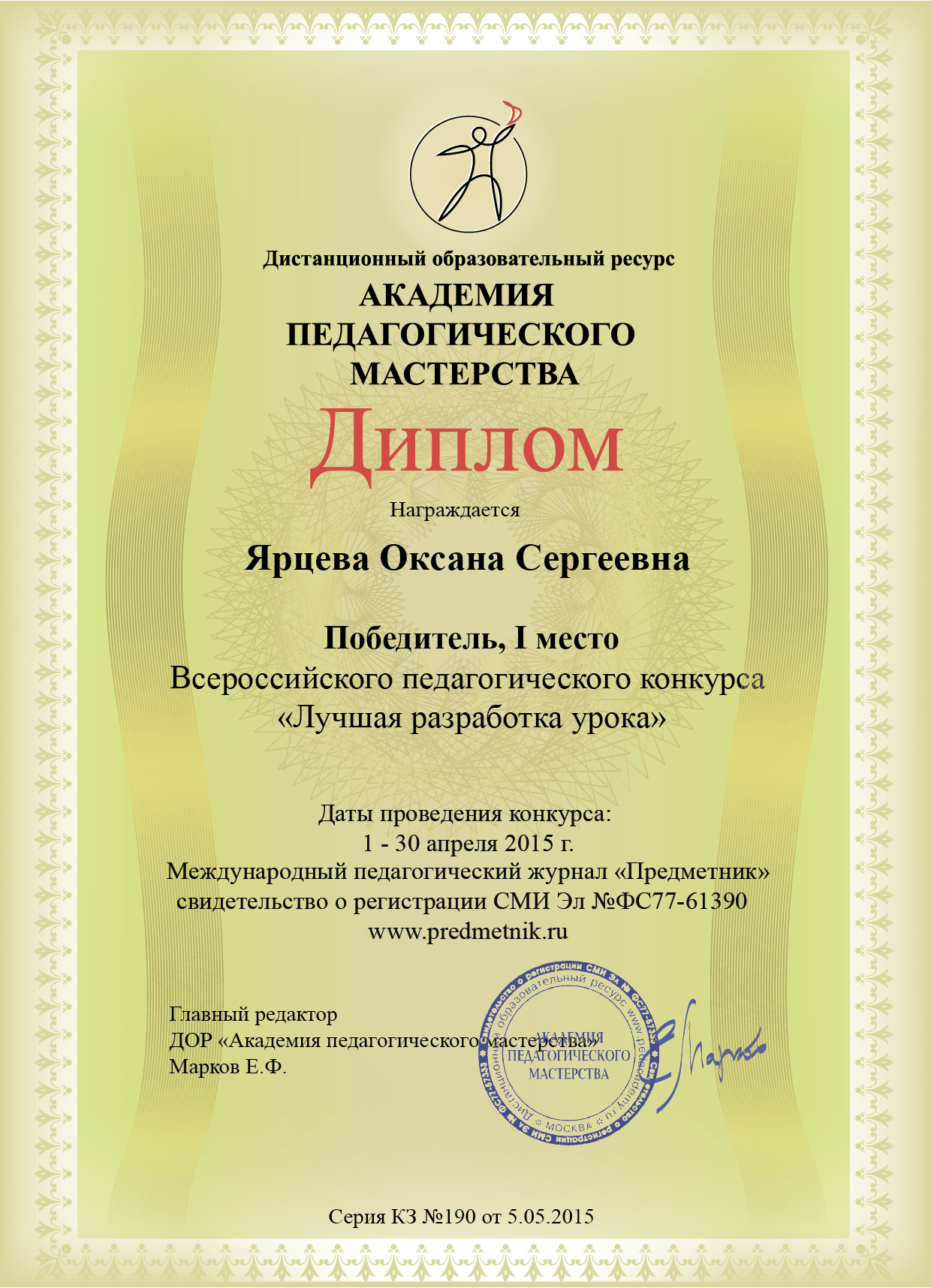Разработка цикла литературных уроков на основе рассказа «Человек с юга» английского писателя Роальда Даля
Автор: Бакалдина Ольга Ивановна
Организация: МБОУ лицей №1
Населенный пункт: ХМАО-Югра, Тюменская область, г. Сургут
Introduction
Literary lessons in teaching English language.
In recent years many people face the problem of reducing students’ interest to reading both Russian and foreign literature. I am sure that reading is the main factor of development of every person. And we – teachers should do our best to improve this situation. Trying to do it I include some lessons devoted to British and American writers into my working programs and call them «The cycle of literary lessons». I usually choose not very complicated stories which students can read in the original and feel what the real English language is. I give them the opportunity to acquaint with the life and the works of the author. It awakes the interest not only to the learning of English language but also to reading as a process and to reading some world- famous writers. And now I’d like to share some ideas of my work.
For example in the 11th grade I have four lessons devoted to British writer Roald Dahl. The first lesson is usually connected with the biography of the author and his life. We watch or do presentations, discuss his life, describe pictures, make predictions and so on. Each teacher can organize this lesson using personal ideas. I am not going to give the description of this lesson. But I am going to explain why I have chosen the story « Man from the South» and I am going to give three plans of the lessons based on this story created by me.
This story is interesting for me from several points of view. First of all I like the plot of the story. It is intriguing. It keeps you in tense. You are interested to know the end of the story. Secondly the story is based on the dialogue. And it is fantastically done by the author. Roald Dahl gives perfect descriptions of the places and people. They are not boring and I should say rather interesting to read.
Thirdly the story is interesting from the point of view of its language. It has new words, some commonly used expressions and phrases.
I am very glad to meet here the accent language of the man from the south. It is great to discuss it with the students. I find this story useful from the point of view of grammar. There are good examples of some grammar constructions that we learn at school. Let’s take participle for example. There are many sentences illustrating them. The story gives idea of the way people work and rest in the country.
It can be used to develop students’ interpretation, imagination, prediction and critical thinking. It acquaints us with British culture.
Why may it be interesting for the students? First of all it gives the scenes of real life. The students can be involved into similar situations in their life and they should know how to behave themselves.
The story is not difficult to read and it makes them understand that they can read some works in the original and it is great.
The story is long and I divided it into three parts. That’s why we have three lessons and I present them to you.
After reading and discussing Roald Dahl’s biography students are usually eager to read some more of his stories.
The cycle of literary lessons.
Lesson № 1
Theme: Literary reading. The story «Man from the south» by Roald Dahl.
Tasks:
1. To acquaint students with authentic British story.
2. To introduce the new words and expressions from the story and to activate them.
3. To develop students’ imagination, predicting and speaking skills.
4. To develop the listening skills.
5. To develop the reading skills.
Equipment:
1. Texts with opinions of different people.
2. Sheets with exercises.№1, №2, №3, №4.
3. The story « Man from the south».
4. Presentation.
5. Computer and television.
The plan of the lesson.
- Organizing moment.
- The introduction of the theme and the tasks of the lesson.( small computer presentation)
- Checking up of the home-task.(short information about R. Dahl)
- Listening (or reading) of the opinions of some readers about the story «Man from the South» and their discussions.
- The text with the first opinion
- The text with the second opinion.
- Answering questions.
5. The development of speaking and listening skills.
1) Predictions of the students (The students predict what the story may be about)
2) Discussions of the predictions. Whose prediction is better?
6. The work with the text.
A. Introduction and primary activation of words and phrases.
1) Ex 1. 2) Ex 2. 3) Ex 3.
B. The development of reading skills.
1) Reading of the text and finding descriptions of people and places.
2) Retelling of the descriptions (places, heroes).
3) Reading and finding all the sentences with participle. (The translation into Russian).
4) Doing T (True) or F (False) exercise.
C. The development of speaking skills.
1) Prediction of the second part of the story.
2) Answering teacher’s questions.
7. Home-task.
1) Learn the words and phrases.
2) Make the prediction of the second part of the story (for the rest of the students).
8. Evaluation of students’ work.
The cause of the lesson.
1. Organizing moment.
2. The introduction of the theme and the tasks of the lesson.
Dear students today we start the cycle of literary lessons devoted to British writer Roald Dahl and his story « Man from the South».
You will be able to read one of the English stories written by this writer in the original English language. You will develop reading, speaking and listening skills. You will train yourselves in making imaginations and predictions. And of course we won’t be able to do it all without learning new words and expressions.
3. Checking up of the home-task.
But now we are going to check up your home-task. You were to make up stories about the life of Roald Dahl, world famous British writer. I offer you to use slides of presentation to present your stories. (Students tell the class their stories)
4. The development of listening skills and introduction to the story.
The story « Man from the South» is rather popular among the people all over the world. So they write their opinions in the charts and blogs. Now you will hear two of them. (Or you will read two of them).Try to understand the opinions and to answer some of my questions.
(The students listen to two opinions and answer teacher’s questions)
- The development of speaking and listening skills.
- We have listened to two opinions and discussed them. And now I offer you to make your own predictions of this story. What do you think it may be about?
(Pupils make predictions.)
- Discussions of the predictions. Whose prediction is better?
6. The work with the text.
A. Introduction of words and phrases and their primary activation.
The story contains new words and phrases. We are going to work with them to make our reading more comfortable.
(The students do exercises №1, №2, №3)
B. The development of reading skills.
1). Reading and finding descriptions of places and people.
And now we are ready to read the first part of the story
« Man from the South» by Roald Dahl. Take the sheets with the text.
Read the story and find the descriptions of people and places.
2). Oral description of the places and the heroes.
Describe orally the places and heroes you have found in the story.
3). Reading and finding the sentences with participles.
Look through the text and find the sentences with participles. Be ready to translate them into Russian.
- Doing T (True) or F (False) exercise.
Now let’s do exercise №4. Decide if the statements are T (True) or F (False)
C. Development of speaking skills.
1) Prediction of the second part of the text.
Try to imagine what will happen in the second part of the story.
(This task is recommended for the students with good command of English at the lesson)
2). Answering teacher’s questions.
7. Home- task.
1). Learn the words and phrases.
2). Predict the second part of the story.
8. Evaluation of student’s work.
Аppendix.
Opinion №1
By Sarah Downie.
The short story « Man from the South» by Roald Dahl is one of my favorite stories. I like the descriptions of scenery and people he gives. I find this story comical. It is also enjoyable because it could easily be one of the crazy stories anyone can come from the beach telling about. When people are relaxed on vacation crazy things like this can easily be made up and people tend to get in a lot of mischief when at the beach enjoying a long day in the sun.
Opinion №2
By Arild Haugland
This is a very well written short story. Roald Dahl wrote many books and short stories for children and this is his best short story in my opinion. It connects to both children and older people like me. It is very exciting and is built up very competently. The language is easy to understand and to read. Roald Dahl knows his stuff.
Questions.
1. Does Sara Downie like or hate this story?
2. Why does she like it?
3. Does she find it comical or tragic?
4. Sara thinks this story to be enjoyable. Why?
5. Who did Roald Dahl write his books for according to Arild Haugland’s opinion?
6. What does he think of the story?
Exercise №1
Read the sentences and choose the variant close to the meaning of the underlined word.
1. He wandered down the garden towards the pool.
a) to walk b) to run c) to jump
2. The wind was blowing strongly through the tops of the palm trees making the leaves hiss and crackle as though they were on fire.
a) to whisper b) to cry c) to speak
a) to produce a loud sound b) to shoot c) to break
3. In the pool itself there were girls and boys splashing
a) to shout b) to beat each other c) to fall into water making a lot of water drops
4. He came bouncing along the side of the pool.
a) to jump a little b) to lean c) to fall
5. He began taptapping with his fingers against the kneecaps.
a) to knock b) to stroke c) to beat
6. The boy paused for a moment and he glanced first at the English girl, then at me.
a) to look at smth. (smb) b) to watch c) to follow
a) to knock b) to stroke c) to beat
7. « We were only having a little bet»- mumbled the little man from the bed.
a) to cry b) to say smth not clearly c) to show
Exercise № 2
Translate the words into English using some clues.
- Annex - a part of the house
- A bed - a part of land with flowers
- A wisp of hair -a small quantity of sth or an amount of sth
- Vessel - means of transport to go by water
- A cluster - a bunch of grape
- Implements - things with the help of which we repair or build sth
- Tension - opposite to relaxation
- Buckskin shoes - deerskin shoes
Exercise № 3
Read and translate into Russian commonly used expressions
1. To get on nicely with smb
2. To try to make smth out of smth
3. To have some fun
4. To make a bet
5. To relish a private little secret all his (her) own.(to relish - to enjoy)
6. Come to think of it
7. To bet smth
8. To test smth for firmness with one’s fingers
9. To come into view
10. To win smth from smb
11. To put out a hand to do smth
12. To have nothing to bet
13. To give a shrug of the shoulders
14. To troop into the room
Exercise №4
Read the statements and say if they are true or false.
1. The author came to the hotel to rest.
2. He was bathing with some young men and women.
3. Roald Dahl enjoyed the nature near the hotel.
4. People in the pool were from the south.
5. People in the pool were American cadets.
6. People in the pool had a rest in this place.
7. People in the pool were from naval training vessel from America and were training here.
8. The hotel was in America.
9. The hotel was in Britain.
10. The man from the south had an Italian or Spanish accent.
11. The man from the south had a northern accent.
12. He was young.
13. He was rich.
14. He offered the cadet to bet.
15. The American cadet didn’t want to bet with the man from the south.
16. The American cadet wanted to bet on fifty dollars.
17. The American cadet wanted to bet on a car.
18. The man from the south wanted to bet on cadet’s little finger.
MAN FROM THE SOUTH / 1948
ROALD DAHL
Part 1
It was getting on toward six o'clock so l thought I'd buy myself a beer and go out and sit in a deck chair by the swimming pool and have a little evening sun.
I went to the bar and got the beer and carried it outside and wandered down the garden toward the pool.
It was a fine garden with lawns and beds of azaleas and tall coconut palms, and the wind was blowing strongly through the tops of the palm trees making the leaves hiss and crackle as though they were on fire. I could see the clusters of big brown nuts hanging down underneath the leaves.
There were plenty of deck chairs around the swimming pool and there were white tables and huge brightly colored umbrellas and sunburned men and women sitting around in bathing suits. In the pool itself there were three or four girls and about a dozen boys, all splashing about and making a lot of noise and throwing a large rubber ball at one another.
I stood watching them. The girls were English girls from the hotel. The boys I didn't know about, but they sounded American and I thought they were probably naval cadets who'd come ashore from the U.S. naval training vessel which had arrived in harbor that morning.
I went over and sat down under a yellow umbrella where there were four empty seats, and I poured my beer and settled back comfortably with a cigarette.
It was very pleasant sitting there in the sunshine with beer and cigarette. It was pleasant to sit and watch the bathers splashing about in the green water.
The American sailors were getting on nicely with the English girls. They'd reached the stage where they were diving under the water and tipping them up by their legs. Just then I noticed a small, oldish man walking briskly around the edge of the pool.
He was immaculately dressed in a white suit and he walked very quickly with little bouncing strides, pushing himself high up onto his toes with each step. He had on a large creamy Panama hat, and he came bouncing along the side of the pool, looking at the people and the chairs.
He stopped beside me and smiled, showing two rows of very small, uneven teeth, slightly tarnished. I smiled back.
"Excuse pleess, but may I sit here?" Certainly," I said. 'Go ahead."
He bobbed around to the back of the chair and inspected it for safety, then he sat down and crossed his legs. His white buckskin shoes had little holes punched all over them for ventilation.
"A fine evening," he said. "They are all evenings fine here in Jamaica." I couldn't tell if the accent was Italian or Spanish, but I felt fairly sure he was some sort of a South American. And old too, when you saw him close. Probably around sixty-eight or seventy.
"Yes," I said. "It is wonderful here, isn't it?"
"And who, might I ask, are all dese? Dese is no hotel people." He was pointing at the bathers in the pool.
"I think they're American sailors," I told him. "They're Americans who are learning to be sailors."
"Of course dey are Americans. Who else in de world is going to make as much noise at dat? You are not American, no?"
"No," I said. "I am not."
Suddenly one of the American cadets was standing in front of us. He was dripping wet from the pool and one of the English girls was standing there with him.
"Are these chairs taken?" he said.
"No," I answered.
"Mind if I sit down?"
"Go ahead."
"Thanks," he said. He had a towel in his hand and when he sat down he unrolled it and produced a pack of cigarettes and a lighter. He offered the cigarettes to the girl and she refused; then he offered them to me and I took one. The little man said, "Tank you, no, but I tink I have a cigar." He pulled out a crocodile case and got himself a cigar, then he produced a knife which had a small scissors in it and he snipped the end off the cigar.
"Here, let me give you a light." The American boy held up his lighter."Dat will not work in dis wind."
"Sure, it'll work. It always works."
The little man removed his unlighted cigar from his mouth, cocked his head on one side and looked at the boy.
"All-ways?" he said slowly.
"Sure, it never fails. Not with me anyway."
The little man's head was still cocked over on one side and he was still watching the boy. "Well, well, So you say dis famous lighter it never fails. Iss dat you say?"
"Sure," the boy said. "That's right." He was about nineteen or twenty with a long freckled face and a rather sharp birdlike nose. His chest was not very sunburned and there were freckles there too, and a few wisps of palereddish hair. He was holding the lighter in his right hand, ready to flip the wheel. "It never fails," he said, smiling now because he was purposely exaggerating his little boast. "I promise you it never fails."
"One momint, pleess." The hand that held the cigar came up high, palm outward, as
though it were stopping traffic. "Now juss one momint." He had a curiously soft, toneless voice and he kept looking at the boy all the time.
"Shall we not perhaps make a little bet on dat?" He smiled at the boy. "Shall we not
make a little bet on whether your lighter lights?"
"Sure, I'll bet," the boy said. "Why not?"
"You like to bet?"
"Sure, I'll always bet."
The man paused and examined his cigar, and I must say I didn't much like the way he
was behaving. It seemed he was already trying to make something out of this, and to
embarrass the boy, and at the same time I had the feeling he was relishing a private little
secret all his own.
He looked up again at the boy and said slowly, "I like to bet, too! Why we don't have
a good bet on dis ting? A good big bet"
"Now wait a minute," the boy said. "I can't do that, But I'll bet you a quarter. I'll even
bet you a dollar, or whatever it is over here some shillings, I guess."
The little man waved his hand again. "Listen to me. Now we have some fun.
We make a bet. Den we go up to my room here in de hotel where iss no wind and I bet you
you cannot light dis famous lighter of yours ten times running without missing once."
"I'll bet I can," the boy said . "All right. Good. We make a bet, yes?"
'Sure. I'll bet you a buck."
"No, no. I make you very good bet. I am rich man and I am sporting man also. Listen to me. Outside de hotel iss my car. Its very fine car. American car from your country.
Cadillac."
"Hey, now. Wait a minute." The boy leaned back in his deck chair and he laughed. "I can't put up that sort of property.
This is crazy."
"Not crazy at all. You strike lighter successfully ten times running and Cadillac is yours.
You like to have dis Cadillac, yes?"
"Sure, I'd like to have a Cadillac." The boy was still grinning.
"All right. Fine. We make a bet and I put up my Cadillac."
"And what do I put up?"
The little man carefully removed the red band from his still unlighted cigar.
"I never ask you, my friend, to bet something you cannot afford.
You understand?"
"Then what do I bet?"
"I make it very easy for you, yes?"
"Okay. You make it easy."
"Some small ting you can afford to give away, and if you did happen to lose it you
would not feel too bad. Right?"
"Such as what?"
"Such as, perhaps, de little finger of your left hand."
"My what!" The boy stopped grinning.
"Yes. Why not? You win, you take de car. You looss, I take de finger."
"I get it. How d'you mean, you take the finger?"
"I chop it off."
Questions.
1. What do you think of the bet? Is it a good or a bad bet?
2. What do you think of a man from the South?
3 Why does he offer such a bet?
4. Will the young man agree or disagree to make a bet? Why?
Lesson № 2
Theme: Literary reading.
The story «Man from the South » by Roald Dahl.
Tasks:
1. To acquaint students with new words and accent English (to avoid difficulties in understanding the text).
2. To develop speaking skills.
3. To learn to interact in the discussion.
4. To develop reading skills.
5. To develop predicting skills.
Equipment:
1. Copies of the story.
2. Sheets with exercises and tasks.
The plan of the lesson.
1. Organizing moment.
2. The checking up of the home-task.
3. The work with the words
- Ex.5
- Ex. 6 (List of new words in the context).
4. Reading of the text.
- Reading
- Discussion of the text according to the questions.
5. Development of speaking skills.
Prediction of the scene of the bet by the students.
- Home-task:
- Learn the new words.
- Retell the second part of the story.
The course of the lesson.
1. Organizing moment.
2. The introduction of the theme and the tasks of the lesson
Dear students, today we continue to read and to discuss the story « Man from the South» by Roald Dahl.
You will get to know some new words and accent English. You will develop reading, speaking and predicting skills. You will also learn to interact in a discussion.
Before starting our lesson I would like to know if you liked the first part of the story. (Students express their opinions).
3. Checking up of the home-task.
And now I want to check up your home assignment. You were to learn new words and expressions and to predict the second part of the story. At first I would like to find out how you have learned the words. I give you some cards and you are to read the words and to translate them from Russian into English.
- Students work with the cards.
- Prediction of the second part of the story.
Are there any volunteers to predict the second part of the story?
(The students present the class their stories).
4. The work with the new words.
Before reading the second part of the story let’s do exercises №5 and №6.
5. Reading of the story.
A. Reading.
And now let’s read the story. Pay attention to the new words.
B. Discussion.
We have read the text and now I would like you to answer the questions. (Exercise №7).
6. Development of speaking skills.
Make the prediction of the scene of the bet.
(The students try to predict the scene of the bet)
7. Home-task.
1) Learn the new words.
2) Retell the second part of the story.
Аppendix.
Card №1.
Read the words and translate them from Russian into English.
1.бродить
2.шипеть, шелестеть
3. потрескивать, хрустеть
4. брызгаться
5. подпрыгивать
6. постукивать
7. взглянуть
8. бормотать
Card №2
Translate the sentences into English.
1.Он любил бродить по саду.
2. Листья шелестели на ветру.
3. Ветки дерева потрескивали горя в камине.
4. Дети плавали и брызгались в бассейне.
5. Его походка была необычной. Он шёл и подпрыгивал.
6.Её брат любил смотреть в окно и постукивать пальцами по подоконнику.
7. Она влюбилась в него с первого взгляда.
8. Мужчина шёл по улице и что-то бормотал себе под нос.
Exercise № 5
Give the English words to the accent words of the man from the south.
1. pleese
2. dey
3. dat
4. tink
5. dis
6. iss
7. den
8. de
9. ting
10. looss
11. dere
12. momint
13. ave
14. dose
15. dem
16. dese
Exercise№6
- The little man leaned back, spread out his hands palms upward and gave a tiny contemptuous shrug of the shoulders.
- The wick lighted and burned with a small steady yellow flame.
- He had pale, almost colorless eyes with tiny bright black pupils.
- He cupped his hands around the lighter and flipped the wheel.
- It was obvious that a small tension was beginning to build up inside him.
- Then he started shiftihg about his seat and rubbing his chest and stroking the back of his neck.
- He placed both hands on his knees and began taptapping with his fingers against the kneecaps.
If it misses just once then I forfeit the little finger of the left hand.
Exercise №7
Read the text and answer the questions
1) What did American cadet think of the bet?
2) What did his girl think of the bet?
3) What did the author think of the bet?
4) What did the man from the south think of the bet?
5) Did the old man succeed in disturbing the young man?
6) How did he hook him on the bet?
8) Where did he plan to make a bet?
9) What did the man from the south ask the maid to bring?
10) Why did he need all those implements?
11) Can you imagine the scene of the bet?
12) How did the young man feel himself?
The story « Man from the South»by Roald Dahl
Part 2
"Jumping jeepers! That's a crazy bet. I think I'll just make it a dollar."
The little man leaned back, spread out his hands palms upward and gave a tiny
contemptuous shrug of the shoulders. "Well, well, well," he said. "I do not understand.
You say it lights but you will not bet. Den we forget it, yes?"
The boy sat quite still, staring at the bathers in the pool. Then be remembered
Suddenly he hadn't lighted his cigarette. He put it between his lips, cupped his hands around the lighter and flipped the wheel. The wick lighted and burned with a small,
steady, yellow flame and the way he held his hands the wind didn't get to it at all.
"Could I have a light, too?" I said.
"Gee, I'm sorry. I forgot you didn't have one." I held out my hand for the lighter, but he stood up and came over to do it for me.
"Thank you," I said, and he returned to his seat.
"You having a good time?" I asked.
"Fine," he answered. "It's pretty nice here."
There was a silence then, and I could see that the little man had succeeded in
disturbing the boy with his absurd proposal. He was sitting there very still, and it was
obvious that a small tension was beginning to build up inside him. Then he started
shifting about in his seat, and rubbing his chest, and stroking the back of his neck, and
finally he placed both hands on his knees and began taptapping with his fingers against
the kneecaps. Soon he was tapping with one of his feet as well.
"Now just let me check upon this bet of yours," he said at last, "You say we go up to
your room and if I make this lighter light ten times running I win a Cadillac. If it misses
just once then I forfeit the little finger of my left hand. Is that right?"
"Certainly. Dat is de bet. But I think you are afraid."
"What do we do if I lose? Do I have to hold my finger out while you chop it off?"
"Oh, no! Dar would be no good. And you might be tempted to refuse to hold it out.
What I should do I should tie one of your hands to de table before we started and I should
Stand dere with a knife ready to go chop de momint your lighter missed."
"What year is the Cadillac?" the boy asked.
"Excuse. I not understand."
"What year—how old is the Cadillac?"
"Ah! How old? Yes. It is last year. Quite new car. But I see you are not betting man.
Americans never are."
The boy paused for just a moment and he glanced first at the English girl, then at me.
"Yes," he said sharply. "I'll bet you."
"Good!" The little man clapped his hands together quietly, once. "Fine," he said. "We
do it now. And you, sir," he turned to me, "you would perhaps be good enough to, what
you call it, to—to referee." He had pale, almost colorless eyes with tiny bright black
pupils.
"Well," I said. "I think it's a crazy bet. I don't think I like it very much,"
"Nor do I." said the English girl. It was the first time she'd spoken. "I think its a
stupid, ridiculous bet."
"Are you serious about cutting off this boy’s finger if he loses?" I said." Certainly, l am. Also about giving him Cadillac if he win. Come now. We go to my
room."
He stood up. "You like to put on some clothes first?" he said.
"No," the boy answered. "I'll come like this." Then he turned to me. "I'd consider it a
favor if you'd come along and referee."
"All right," I said. "I'll come along, but I don't like the bet."
"You come too," he said to the girl. "You come and watch."
The little man led the way back through the garden to the hotel. He was animated
now, and excited, and that seemed to make him bounce up higher than ever on his toes as
he walked along.
"I live in annex," he said. "You like to see car first? Iss just here."
He took us to where we could see the front driveway of the hotel and he stopped and
pointed to a sleek palegreen Cadillac parked close by.
"Dere she iss. De green one. You like?"
"Say, that's a nice car," the boy said.
"All right. Now we go up and see if you can win her."
We followed him into the annex and up one flight of stairs. He unlocked his door and
we all trooped into what was a large pleasant double bedroom. There was a woman's
dressing gown lying across the bottom of one of the beds.
"First," he said, "we 'ave a little Martini."
The drinks were on a small table in the far corner, all ready to be mixed, and there
was a shaker and ice and plenty of glasses. He began to make the Martini, but meanwhile
he'd rung the bell and now there was a knock on the door and a coloured maid came in.
"Ah!" he said, putting down the bottle of gin, taking a wallet from his pocket and
pulling out a pound note. "You will do something for me now, pleess." He gave the maid
the pound.
"You keep dat," he said. "And now we are going to play a little game in here and I
want you to go off and find for me two—no tree rings. I want some nails; I want a
hammer, and I want a chopping knife, a butcher's chopping knife which you can borrow
from de kitchen. You can get, yes?"
"A chopping knife!" The maid opened her eyes wide and clasped her hands in front of
her. "You mean a real chopping knife?"
"Yes, yes, of course. Come on now, pleess. You can find dose rings surely for me."
"Yes, sir, I'll try, sir. Surely I'll try to get them." And she went.
The little man handed round the Martinis. We stood there and sipped them, the boy
with the long freckled face and the pointed nose, barebodied except for a pair of fadedbrown bathing shorts; the English girl, a largeboned, fairhaired girl wearing a pale blue
bathing suit, who watched the boy over the top of her glass all the time; the little man
with the colourless eyes standing there in his immaculate white suit drinking his Martini
and looking at the girl in her pale blue bathing dress. I didn't know what to make of it all.
The man seemed serious about the bet and he seemed serious about the business of
cutting off the finger. But hell, what if the boy lost? Then we'd have to rush him to the
hospital in the Cadillac that he hadn't won. That would be a fine thing. Now wouldn't that
be a really fine thing? It would be a damn silly unnecessary thing so far as I could see.
"Don't you think this is rather a silly bet?" I said.
"I think it's a fine bet," the boy answered. He had already downed one large Martini.
"I think it's a stupid, ridiculous bet," the girl said. "What'll happen if you lose?"
"It won't matter. Come to think of it, I can't remember ever in my life having had any
use for the little finger on my left hand. Here he is." The boy took hold of the finger.
"Here he is and he hasn't ever done a thing for me yet. So why shouldn't I bet him. I think
it's a fine bet."
Lesson № 3
Theme: Literary reading.
The story « Man from the south» by Roald Dahl.
Tasks:
1) To develop critical reading.
2) To develop speaking skills.
3) To develop the ability to work in groups.
4 To develop the ability to compare texts.
Equipment:
1. Sheets with the chart №1
2. Sheets with five parts of the text.
The plan of the lesson.
1. Organizing moment.
2 The checking up of the home-task.
1) Words
2) Retelling of the part of the text
4. The work with the text.
Group work.
1) Reading the parts of the text.
2) Making up one story logically combined.
5. Development of speaking skills
- Imagination and telling of the missing part.
- Comparison of the oral variant and the written missing part.
- Expression of the woman’s impressions.
- Reproduction of the end of the story.
6. Home -task.
Make up your own end of the story.
The course of the lesson
1. Organizing moment.
2. Introduction of the theme and the tasks of the lesson.
Dear students, today we have one more literary lesson devoted to the story «Man from the South» written by English writer Roald Dahl.
During our lesson you will develop reading and speaking skills, ability to work in groups and the ability to compare texts. I hope that you will like working with the story. And now let’s start our lesson.
3. The checking up of the home-task.
Your home assignment was to learn the words and to retell the second part of the story.
A. So we are going to work with the words.
1) Take the cards and match the words with their translations.
2) Make up your own sentences with these words.
B. Retell the second part of the story.
4. The work with the text.
Now we are going to work in groups. Make the groups, please. Each group gets some parts of the story. You must read them and make up one logically combined story.
(Students work in groups)
5. Development of speaking skills.
1) Imagination and telling of the missing part.
Students, you did a great job. You have read the parts of the text and made successfully one story. Unfortunately one part was missed. I offer you to use your imagination and to restore this part.
2)Comparison of oral and written parts.
And now let’s compare your oral variants with the written missing part.
3). Expression of the woman’s impressions.
While working with the parts we came across a new heroine, the woman. What can you tell me of her impressions?
4).Reproduction of their own end of the story.
We have read the story « Man from the South» by Roald Dahl. I want you to make the end of the story. Who can try to do it right now?
6. Home - task.
Your home assignment is to make up your own end of the story.
7. The evaluation of students’ work.
Appendix.
Chart №1
Match the English words and their Russian equivalents.
1) to lean a) гладить, поглаживать
2) to spread out b) фитиль
3) a wick c) наклонять(ся)
4) tension d) перемещать(ся),передвигать(ся)
5) pupils e) тереть(ся)
7) to cup f) конфисковать, потерять
8) to flip g) напряжение, напряжённое состояние
9) to shift h) зрачки
10) to rub i) коленная чашечка
11) to stroke j) раскидывать, протягивать
12) to tap (taptap) k) придавать чашевидную форму
13) a knee-cap l) щёлкать, слегка ударять
The story «Man from the South» by Roald Dahl
Text 3
Part 1
The little man smiled and picked up the shaker and refilled our glasses.
"Before we begin," he said, "I will present to de—to de referee de key of de car." He
produced a car key from his pocket and gave it to me. "De papers," he said, "de owning
papers and insurance are in de pocket of de car."
Then the colored maid came in again. In one hand she carried a small chopper, the
kind used by butchers for chopping meat bones, and in the other a hammer and a bag of
nails.
"Good! You get dem all. Tank you, tank you. Now you can go." He waited until the
maid had closed the door, then he put the implements on one of the beds and said, "Now
we prepare ourselves, yes?" And to the boy, "Help me, pleess, with dis table. We carry it
out a little."
Part 2
It was the usual kind of hotel writing desk, just a plain rectangular table about four
feet by three with a blotting pad, ink, pens and paper. They carried it out into the room
away from the wall, and removed the writing things.
"And now," he said, "a chair," He picked up a chair and placed it beside the table. He
was very brisk and very animated, like a person organizing games at a children's party.
"And now de nails. I must put in de nails." He fetched the nails and he began to hammer
them into the top of the table.
We stood there, the boy, the girl, and I, holding Martinis in our hands, watching the
little man at work. We watched him hammer two nails into the table, about six inchesapart. He didn't hammer them right home; he allowed a small part of each one to stick up.
Then he tested them for firmness with his fingers.
Anyone would think the son of a bitch had done this before, I told myself. He never hesitates. Table, nails, hammer, kitchen chopper. He knows exactly what he needs and how to arrange it.
"And now," he said, "all we want is some string." He found some string. "All right, at
last we are ready. Will you pleess to sit here at de table," he said to the boy.
The boy put his glass away and sat down.
Part 3( missing part )
"Now place de left hand between dese two nails. De nails are only so I can tie your
hand in place. All right, good. Now I tie your hand secure to de table—so."
He wound the string around the boy's wrist, then several times around the wide part
of the hand, then he fastened it tight to the nails. He made a good job of it and when he'd
finished there wasn't any question about the boy being able to draw his hand away But he
could move his fingers.
"Now pleess, clench de fist, all except for de little finger. You must leave de little
finger out, lying on de table.
"Ex-cellent! Ex-cellent! Now we are ready. Wid your right hand you manipulate de
lighter. But one momint, pleess."
He skipped over to the bed and picked up the chopper. He came back and stood
beside the table with the chopper in his hand.
"We are all ready?" he said, "Mister referee, you must say to begin"
Part 4
The English girl was standing there in her pale blue bathing costume right behind the
boys chair. She was just standing there, not saying anything. The boy was sitting quite
still, holding the lighter in his right hand, looking at the chopper. The little man was
looking at me.
"Are you ready?" I asked the boy.
"I'm ready."
"And you?" to the little man.
"Quite ready," he said and he lifted the chopper up in the air and held it there about
two feet above the boy's finger, ready to chop. The boy watched it, but he didn't flinch
and his mouth didn't move at all. He merely raised his eyebrows and frowned.
"All right," I said. "Go ahead."
The boy said, "Will you please count aloud the number of times I light it."
"Yes," I said. "I'll do that."With his thumb he raised the top of the lighter, and again with the thumb he gave the
wheel a sharp flick. The flint sparked and the wick caught fire and burned with a small
yellow flame.
"One!" I called.
He didn't blow the flame out; he closed the top of the lighter on it and he waited for
perhaps five seconds before opening it again.
He flicked the wheel very strongly and once more there was a small flame burning on
the wick.
"Two!"
No one else said anything. The boy kept his eyes on the lighter. The little man held
the chopper up in the air and he too was watching the lighter.
"Three!"
"Four!"
"Five!"
"Six!"
"Seven!" Obviously it was one of those lighters that worked. The flint gave a big
spark and the wick was the right length. I watched the thumb snapping the top down onto
the flame. Then a pause. Then the thumb raising the top once more. This was an all thumb
operation. The thumb did everything. I took a breath, ready to say eight. The
thumb flicked the wheel. The flint sparked. The little flame appeared.
"Eight!" I said, and as I said it the door opened.
Part 5
We all turned and we saw a woman
standing in the doorway, a small, black haired woman, rather old, who stood there for
about two seconds then rushed forward shouting, "Carlos! Carlos!" She grabbed his wrist,
took the chopper from him, threw it on the bed, took hold of the little man by the lapels
of his white suit and began shaking him very vigorously, talking to him fast and loud and
fiercely all the time in some Spanish-sounding language. She shook him so fast you
couldn't see him any more. He became a faint, misty, quickly moving outline, like the
spokes of a turning wheel.
Then she slowed down and the little man came into view again and she hauled him
across the room and pushed him backward onto one of the beds. He sat on the edge of it
blinking his eyes and testing his head to see if it would still turn on his neck.
"I am so sorry," the woman said. "I am so terribly sorry that this should happen." She
spoke almost perfect English.
"It is too bad," she went on. "I suppose it is really my fault. For ten minutes I leave
him alone to go and have my hair washed and I come back and he is at it again." She
looked sorry and deeply concerned. The boy was untying his hand from the table. The English girl and I stood there and
said nothing.
"He is a menace," the woman said, "Down where we live at home he has taken
altogether forty-seven fingers from different people, and he has lost eleven cars. In the
end they threatened to have him put away somewhere. That's why I brought him up here."
"We were only having a little bet," mumbled the little man from the bed.
"I suppose he bet you a car," the woman said.
"Yes," the boy answered, "A Cadillac."
"He has no car. It's mine. And that makes it worse," she said, "that he should bet you
when he has nothing to bet with. I am ashamed and very sorry about it all." She seemed
an awfully nice woman,
"Well," I said, "then here's the key of your car." I put it on the table,
"We were only having a little bet," mumbled the little man.
"He hasn't anything left to bet with," the woman said. "He hasn't a thing in the world.
Not a thing. As a matter of fact I myself won it all from him a long while ago. It took
time, a lot of time, and it was hard work, but I won it all in the end." She looked up at the
boy and she smiled, a slow sad smile, and she came over and put out a hand to take the
key from the table.
I can see it now, that hand of hers; it had only one finger on it, and a thumb.
Literature
1. Muller V.K. English-Russian Dictionary (1991)
2. Taube A.M.,Litvinova A.V., Miller A.D., Darglish R.S. Russian-English Dictionary.
3. Resources of internet -https://maggiemcneill.files.wordpress.com/2013/03/man-from-the-south.pdf
4. Resources of internet - http://hubpages.com/literature/biography-of-roald-dahl
5. Resources of internet - https://yandex.ru/images/search?text=%D0%BA%D0%B0%D1%80%D1%82%D0%B8%D0%BD%D0%BA%D0%B8%20roald%20dahl&img_url=http%3A%2F%2Fwww.toptenz.net%2Fwp-content%2Fuploads%2F2013%2F03%2Froald-dahl-celebrity-spy.jpg&pos=19&rpt=simage
Literature:
- Biography of Roald Dahl. Resources of the internet . http://hubpages.com/literature/biography-of-roald-dahl
2. The story « Man from the South». Resources of the internet. https://maggiemcneill.files.wordpress.com/2013/03/man-from-the-south.pd
- razrabotka-tsikla-literaturnyh-urokov.zip (228,7 КБ)
- presentation-theme-tasks-roald-dahls-biography.pptx.zip (2,4 МБ)












